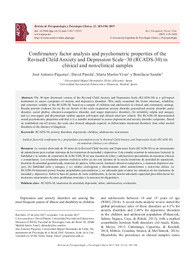Please use this identifier to cite or link to this item:
https://hdl.handle.net/11000/34919Full metadata record
| DC Field | Value | Language |
|---|---|---|
| dc.contributor.author | Piqueras, Jose A | - |
| dc.contributor.author | Pineda, David | - |
| dc.contributor.author | MARTIN-VIVAR, MARIA | - |
| dc.contributor.author | Sandín, Bonifacio | - |
| dc.contributor.other | Departamentos de la UMH::Psicología de la Salud | es_ES |
| dc.date.accessioned | 2025-01-18T10:13:51Z | - |
| dc.date.available | 2025-01-18T10:13:51Z | - |
| dc.date.created | 2017-10 | - |
| dc.identifier.citation | Revista de Psicopatología y Psicología Clínica, 22, 183-196, 2017 | es_ES |
| dc.identifier.issn | 1136-5420 | - |
| dc.identifier.uri | https://hdl.handle.net/11000/34919 | - |
| dc.description.abstract | T he 30-item shortened version of the Revised Child Anxiety and Depression Scale (RCADS-30) is a self-report instrument to assess symptoms of anxiety and depressive disorders. This study examined the factor structure, reliability, and construct validity of the RCADS-30, based on a sample of children and adolescents in clinical and community settings. Results provide evidence for (a) the six factors of the scale (separation anxiety disorder, generalized anxiety disorder, panic disorder, social phobia, obsessive-compulsive disorder, and major depressive disorder), (b) reliability (alpha and omega), and (c) convergent and discriminant validity against self-report and clinical interview criteria. The RCADS-30 demonstrated sound psychometric properties and that it is a suitable instrument to assess depression and anxiety disorder symptoms. Based on established cut-off scores, the scale also showed adequate capacity to differentiate emotional disorders from other mental disorders or the absence of diagnosis. | es_ES |
| dc.description.abstract | La versión abreviada de 30 ítems de la Revised Child Anxiety and Depression Scale (RCADS-30) es un instrumento de autoinforme para evaluar síntomas de los trastornos de ansiedad y depresivos. Este estudio examinó la estructura factorial, la fi abilidad y la validez de constructo de la RCADS-30 en una muestra de niños y adolescentes procedentes de muestras clínicas y comunitarias. Los resultados aportan evidencia sobre (a) los seis factores de la escala (trastorno de ansiedad de separación, trastorno de ansiedad generalizada, trastorno de pánico, fobia social, trastorno obsesivo-compulsivo, y trastorno depresivo mayor), (b) fi abilidad (alfa y omega), y (c) validez convergente y discriminante sobre autoinformes y entrevista clínica. La RCADS-30 demostró poseer buenas propiedades psicométricas y ser adecuada para evaluar los síntomas de los trastornos de ansiedad y depresivos. Sobre la base de puntos de corte establecidos, la escala mostró adecuada capacidad para diferenciar los trastornos emocionales de otros problemas mentales o la ausencia de diagnóstico | es_ES |
| dc.format | application/pdf | es_ES |
| dc.format.extent | 14 | es_ES |
| dc.language.iso | eng | es_ES |
| dc.publisher | Asociación Española de Psicología Clínica y Psicopatología | es_ES |
| dc.rights | info:eu-repo/semantics/openAccess | es_ES |
| dc.rights.uri | http://creativecommons.org/licenses/by-nc-nd/4.0/ | * |
| dc.subject | RCADS-30 | es_ES |
| dc.subject | anxiety disorders | es_ES |
| dc.subject | depression | es_ES |
| dc.subject | children | es_ES |
| dc.subject | adolescents | es_ES |
| dc.subject | assessment | es_ES |
| dc.subject | Trastornos de ansiedad | es_ES |
| dc.subject | depresión | es_ES |
| dc.subject | niños | es_ES |
| dc.subject | adolescentes | es_ES |
| dc.subject | evaluación | es_ES |
| dc.subject.other | CDU::1 - Filosofía y psicología::159.9 - Psicología | es_ES |
| dc.title | Confirmatory factor analysis and psychometric properties of the Revised Child Anxiety and Depression Scale−30 (RCADS-30) in clinical and non-clinical samples | es_ES |
| dc.type | info:eu-repo/semantics/article | es_ES |
| dc.relation.publisherversion | https://doi.org/10.5944/rppc.vol.22.num.3.2017.19332 | es_ES |

View/Open:
Piqueras, Pineda, et al., 2017 (1).pdf
1,31 MB
Adobe PDF
Share:
.png)
